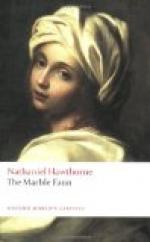It was acknowledged both by Kenyon and Hilda that they had detected, or fancied, the resemblance which Donatello so strongly affirmed; and it added not a little to the grotesque and weird character which, half playfully, half seriously, they assigned to Miriam’s attendant, to think of him as personating the demon’s part in a picture of more than two centuries ago. Had Guido, in his effort to imagine the utmost of sin and misery, which his pencil could represent, hit ideally upon just this face? Or was it an actual portrait of somebody, that haunted the old master, as Miriam was haunted now? Did the ominous shadow follow him through all the sunshine of his earlier career, and into the gloom that gathered about its close? And when Guido died, did the spectre betake himself to those ancient sepulchres, there awaiting a new victim, till it was Miriam’s ill-hap to encounter him?
“I do not acknowledge the resemblance at all,” said Miriam, looking narrowly at the sketch; “and, as I have drawn the face twenty times, I think you will own that I am the best judge.”
A discussion here arose, in reference to Guido’s Archangel, and it was agreed that these four friends should visit the Church of the Cappuccini the next morning, and critically examine the picture in question; the similarity between it and the sketch being, at all events, a very curious circumstance.
It was now a little past ten o’clock, when some of the company, who had been standing in a balcony, declared the moonlight to be resplendent. They proposed a ramble through the streets, taking in their way some of those scenes of ruin which produced their best effects under the splendor of the Italian moon.
CHAPTER XVI
A MOONLIGHT RAMBLE
The proposal for a moonlight ramble was received with acclamation by all the younger portion of the company. They immediately set forth and descended from story to story, dimly lighting their way by waxen tapers, which are a necessary equipment to those whose thoroughfare, in the night-time, lies up and down a Roman staircase. Emerging from the courtyard of the edifice, they looked upward and saw the sky full of light, which seemed to have a delicate purple or crimson lustre, or, at least some richer tinge than the cold, white moonshine of other skies. It gleamed over the front of the opposite palace, showing the architectural ornaments of its cornice and pillared portal, as well as the iron-barred basement windows, that gave such a prison-like aspect to the structure, and the shabbiness and Squalor that lay along its base. A cobbler was just shutting up his little shop, in the basement of the palace; a cigar vender’s lantern flared in the blast that came through the archway; a French sentinel paced to and fro before the portal; a homeless dog, that haunted thereabouts, barked as obstreperously at the party as if he were the domestic guardian of the precincts.




